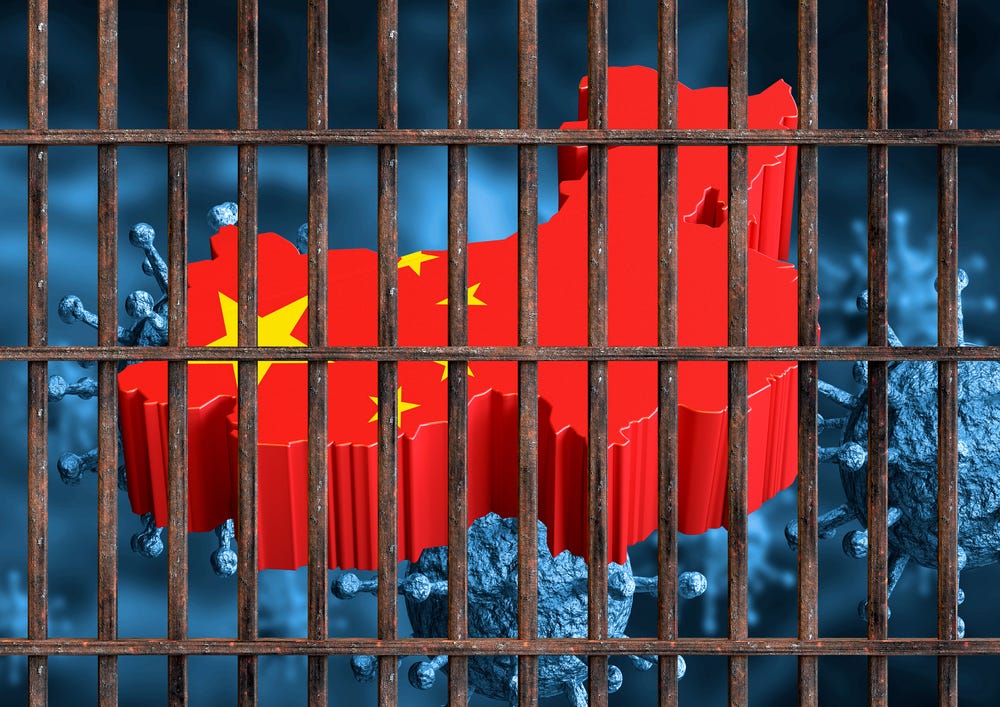E-Pluribus | March 24, 2022
Authoritarianism is still not a good crisis management strategy, COVID lockdowns leaked from China's social lab, and a new website for science heretics.
A round up of the latest and best writing and musings on the rise of illiberalism in the public discourse:
J. D. Tuccille: Your Favorite Crisis Doesn't Justify a Dictatorship
“The ends justify the means”; “we had to destroy the village in order to save it”; “we didn’t make the new rules” — there are many ways to justify bad behavior. J. D. Tuccille of Reason writes that no matter the motives or ostensible good intentions, authoritarianism is not the answer, regardless of how intractable or urgent the problem.
Environmentalists aren't alone in their frustration at not getting their way through the political process. Famously, on January 6, 2021, a mob of Trump supporters threw a collective hissy fit over their preferred candidate's loss at the ballot box. And the rot goes deeper still.
"Roughly 2 in 10 Trump and Biden voters strongly agree it would be better if a 'President could take needed actions without being constrained by Congress or courts,'" the University of Virginia's Center for Politics found in a September 2021 survey. More than 40 percent of both groups at least somewhat agreed with that sentiment.
In 2020, the Democracy Fund Voter Study Group noted that "one-third (33 percent) of Americans have at some point in the last three years said that they think having 'a strong leader who doesn't have to bother with Congress or elections' would be a good system of government."
So, environmental advocates aren't the only people impatient with debate and persuasion. But they are on the leading edge of the illiberal impulse at the same time that they embody the dangers inherent in trying to achieve policy goals through authoritarian means—because authoritarian regimes have a terrible record on environmental issues.
Read it all here.
Eugene Kontorovich and Anastasia Lin: Covid Lockdowns Were a Chinese Import
Whether you subscribe to the Wuhan lab leak theory or just accept that COVID originated in a Chinese wet market, there is little dispute that the virus originated in China (unless you are the Chinese Communist Party looking to shift the blame). At the Wall Street Journal, Eugene Kontorovich and Anastasia Lin posit that the draconian lockdowns used to try to control the spread of the pandemic also came from that country and represent a
“brutal utilitarianism” that has no place in a free country.
In the decades before Covid-19, U.S public-health officials had prepared for a possible global pandemic, informed by past examples such as the 1918-19 Spanish flu, which killed 3% of the world’s population, the flu pandemics of 1958 and 1968, and SARS in 2003.
Stay-at-home orders weren’t part of the script in pre-Covid federal pandemic plans. The idea of “flattening the curve” through what are known as “layered non-pharmaceutical interventions” can be traced to an influential 2007 Centers for Disease Control and Prevention guidance paper, updated in 2017. Contemplating a severe pandemic with a 2% case fatality rate, the CDC recommended now-familiar strategies, such as masking, surface disinfection and temporary school closings.
[ . . . ]
So what led Mr. Newsom and his counterparts in other states to adopt such drastic and untested measures? It seems obvious in retrospect that they were panicked into following China’s lead.
[ . . . ]
By denying individual dignity and freedom, communism leaves no basis for moral judgment other than a brutal utilitarianism. On the Chinese internet at the pandemic’s outset one could read comments to the effect that sacrificing 11 million for the sake of 1.4 billion was a good bargain. A Wuhan resident, in an anonymous March 2020 essay for NPR, saw through this rationale: “When someone says we can accomplish something but we must pay a price, do not rush to applaud. One day you may become the price that is paid.”
Read it all.
Daniel Nuccio: New Heterodox STEM Substack provides science’s thought criminals a home
In the current climate, the wrong view on “diversity” or “equity” can land a scientist in as much trouble as bad science. Daniel Nuccio reports for The College Fix about a new Substack site that aims to provide a voice for those in the STEM fields who object to the subjugation of their disciplines to cultural, social and political concerns.
Among those fighting the oppressive nature of politically correct science is University of Chicago geologist Dorian Abbot, who has become something of a poster child for scientists who refuse to play along.
Last year, Abbot launched an effort to replace DEI with MFE: “Merit, Fairness and Equality.” His latest venture is Heterodox STEM, which launched on New Year’s Eve 2021.
Abbot, who serves as the managing editor of the new Substack, said its goal “is to set up a place where scientists can post their thoughts on issues pertaining to science and society that would be unlikely to be published in many other forums.”
“The majority of scientists support fair, non-discriminatory hiring and maintaining rigorous standards,” he said, adding that an increasing number of scientists are willing to speak out openly about it.
For example, he cited a recent effort at UMass Boston in which numerous STEM professors signed an open letter criticizing a draft university policy to prioritize racial justice and link funding and policy decisions to diversity, equity and inclusion tenets.
“We can only hope that more efforts like this will be successful,” Abbot said.
Read the whole thing.
Around Twitter
Wesley Yang and Thomas Chatterton Williams on race-based healthcare trends:
Via Heterodox Academy, some highlights from a podcast on social psychological science and “diversity”:
And finally, presented without comment:













